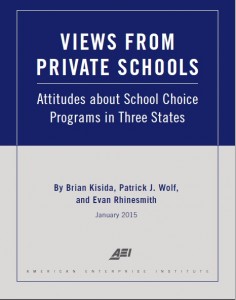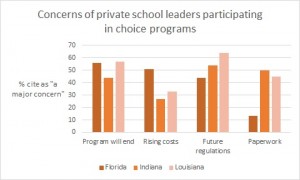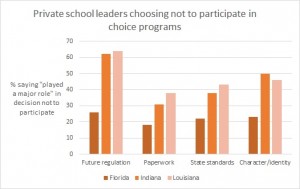 A new survey suggests excessive regulation of school choice programs could cause some private schools not to enroll students who use vouchers or tax credit scholarships.
A new survey suggests excessive regulation of school choice programs could cause some private schools not to enroll students who use vouchers or tax credit scholarships.
The report released this morning by the American Enterprise Institute is the result of what its authors call “the largest and most in-depth survey of its kind.”
The think tank hired a team of University of Arkansas researchers, who polled leaders of hundreds of private schools in Indiana and Louisiana, which have voucher programs, and Florida, which is home to a tax credit scholarship program administered by nonprofits like Step Up For Students, which co-hosts this blog.
Of the three states, leaders in Florida’s private schools appear to be least troubled by state regulations, and most likely to participate in its scholarship program.
“It is imperative that policymakers develop the best mechanisms possible to facilitate successful programs,” the authors write in their conclusion. “Policies meant to burden private schools, starve them, or regulate them into the public school mold are inconsistent with school choice theory and could ultimately hurt the students these policies are designed to help.”

More than half the schools accepting Florida’s scholarships cited the possibility of the program ending one day as a “major concern.” Half were also greatly worried about whether the size of scholarship payments would continue growing to keep up with their increasing costs. The surveys were done last spring, amid a contentious debate over regulation and expansion of the program, but before it was challenged in court.
On the other hand, more than nine in ten schools accepting vouchers in the other two states were at least somewhat concerned about paperwork requirements and the prospect of future regulations. Florida’s schools shared those concerns, but not at the same magnitude.
The report’s authors note that about two-thirds of Florida’s private schools participate in its program, compared to roughly half in Indiana and a third in Louisiana. Florida’s program is older, and participation has increased over time. Leaders at about 40 percent of its schools that don’t accept scholarships now said they might in the future, a higher rate than the other two states.
Florida is also the only state of the three surveyed that allows participating schools to choose from a menu of state-approved tests, rather than requiring their students to take state assessments.
Some of the new findings are at odds with a private school survey released two years ago by the Thomas B. Fordham Institute, which concluded that “regulation by government is not the greatest deterrent to private school participation in voucher and tax credit scholarship programs.” Fordham found factors like student eligibility and scholarship amounts played a larger role.
The new AEI report also finds higher levels of angst about the prospect of private schools being required to comply with state curriculum standards. Fordham has been more supportive of applying the Common Core State Standards to school choice programs, but when its report came out, the backlash against them was only beginning to pick up steam.
Fordham looked at 13 programs, including seven tax-credit scholarship programs, which tend to be less heavily regulated than vouchers funded by direct government appropriations.

Florida had the most heavily regulated tax credit program in Fordham’s analysis, but all but one of the voucher programs studied had greater regulatory burdens. The AEI report includes responses from about three times as many schools, but the researchers note the response rate was higher for Fordham’s surveys.
As the Fordham report noted, schools are more likely to be deterred by some types of regulation than others. Both reports single out Louisiana’s rule barring private schools from applying admissions standards to voucher students as being especially likely to reduce schools’ participation.
At least some schools in all three states said they had trouble communicating with program administrators or navigating administrative hurdles with small number of school employees, prompting the authors of the new AEI report to recommend all three states to look for ways to improve program administration.
In other words, it’s not just the amount of regulation that matters. It also matters whether those regulations are designed and implemented well.



[…] Brian Kisida, Patrick J. Wolf and Evan Rhinesmith’s report on “Views from Private Schools” was discussed in redefinED […]